The following article was featured on the CBC News website
In Depth
Exercise and fitness
Q & A: Marathon fuelSports nutritionist Monique Ryan on your pre-race diet
Last Updated September 24, 2007
CBC News
You've been preparing for your marathon for weeks, taking care to eat well. While not depriving yourself of your favourite treats, you have been focusing on foods that complement your training.
As the marathon approaches, should you alter your diet? We reached Monique Ryan, author of Sports Nutrition for Endurance Athletes, and asked her about what you should be eating in the days leading up to your marathon.
Assuming I have been fairly good with my diet in the weeks leading up to my marathon, are there any changes I should make in that final week?Yes, definitely. Everybody's going to taper — rest up — for the race about five days out. You want to make sure that whatever training you do during that week that you eat appropriately for that training. If there are any hard workouts — the ones that can cause some muscle damage — it's really important to have enough protein as well as the carbohydrates to replenish muscle glycogen stores.
But two days out for sure — even three for some people — you can start thinking about carbo-loading. That's not about depleting your fuel stores but overcompensating your fuel stores. In other words, you're not doing a whole lot those days and you really want to fill up your muscle stores with glycogen. We all know that's the limiting factor that causes us to hit the wall in a marathon. Muscle glycogen is one of the major fuels you are going to use. The really good people — the two hour or so people — are going to use a lot of it. But even the four-, five- and six-hour people are going to use it all the time at some level during the race. So it's important to load up well before the race.
Are there certain foods or food groups I should concentrate on leading up to the race?Don't try anything weird or strange now. Your diet could be a little boring at this time but you have to think of it as being on a nutrition prescription for your race. It's not about it being interesting or gourmet-like. You can save that for after the marathon. Starches, breads and pastas, rice, potatoes and sweet potatoes are all very good sources of carbohydrates that are easily digested. Also fruits and juices, within reason.
Two days before the marathon, people like to go easy on the really high fibre foods, which is fine to do because they want to have — let's just say — lighter bowels for the run. Vegetables are all right a day or so out, but some people don't like having vegetables the day before — especially raw vegetables, or they keep the amounts low.
How much carbohydrate should I have in the days before my marathon?For the average person who's doing nothing the day before, you should have about eight to 10 grams of carbohydrates per kilogram of body weight, which is actually a fairly high amount. You're not going to need a lot of protein that day, you're not going to eat a lot of fat that day, so it's going to be a sort of strange looking diet in the sense that it's going to be a lot of carbs and a lot of starchy food. A big bagel with lots of jam and honey is a great way to get almost 100 grams of carbs in a snack. It's good to go high on the carbs two days before the race because if you feel kind of full and stuffed from that, you don't feel that way the day before the race. You feel that way two days before the race.
If I like to stick to pasta, how much should I have to get the carbs I need?
Three cups of cooked pasta would give you about 100 grams of carbohydrate. The average female runner will want to get in about 500 grams of carbohydrate for the day while carbo-loading. The average male will need about 600 or 700 grams. So if you did 100 grams or so per meal or snack, you'd have to do that four or five times over the day. You could have more pasta than that — but that is a lot to eat at one time.
Is there anything I should keep in mind if I am a vegetarian?It's actually very easy to carbo-load if you're a vegetarian because beans and lentils are great sources of carbohydrates. When you combine those with starches like rice and pasta, you get lots of carbohydrate in one meal. So it's actually a great way to carbo-load.
How much protein do I need in the days before my race?Not much, maybe 100-130 grams per meal at lunch and dinner. It's not a large amount. By then you've finished those really hard runs that kind of cause some muscle damage. When you're resting, you have to assume that your muscle fibres have rejuvenated a little bit in that week that you're doing the taper — otherwise you're not doing the taper right. You don't need huge amounts of protein when you are basically resting.
When should I have my last big meal before the race?I like people to go real heavy on the carbohydrate amounts two days before the marathon. If you have an early start time — which most marathons do — then finish eating by five or six o'clock at the latest. Even have your big meal at two o'clock and have a snack later on. You want to wake up marathon morning feeling kind of hungry so that you can eat a pre-race meal.
And what should that pre-race breakfast consist of?The morning of you will want to get at least 100 grams of carbohydrate in. If you're a larger runner, you might want as much as 120 or 150 grams. Obviously the choices are going to be very tenuous here. You want to be very careful. Again, nothing weird or strange or new. A lot of people like oatmeal. Some people will have an easy to digest cereal, some people like soymilk instead of dairy milk. For others the fruit of choice is a banana or a glass of juice. Certainly it's fine to have a bagel and jam — even a little bit of peanut butter. A lot of people like to have some of those high carbohydrate sports drinks. Others like one of those liquid meals like an energy shake.
What kinds of foods should I focus on after the race — for recovery?Mostly carbohydrates. Obviously you're going to have plenty of muscle damage. That's not going to go away with one little snack. Protein's fine too — whatever looks like it's going to appeal to your stomach. All the bagels and bananas they have at the finish line of the race works out great. Keep hydrating with something that has carbohydrate and sodium in it, like a sports drink. If your stomach feels a little strange, you can focus on taking in liquids. A beer is fine, but not until later in the day. Don't be under the illusion that it's helping you to replenish!
The Barrie RoadRunners
barrie.roadrunners@gmail.com
The Apparel blog can be found here
http://brrapparel.blogspot.com
Barrie RoadRunners Local Routes
Wednesday, September 26, 2007
Pre Marathon Nutrition
Posted by
Barrie RoadRunners
at
8:27 a.m.
![]()
Subscribe to:
Post Comments (Atom)







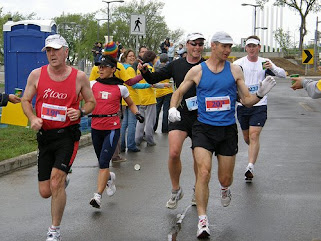









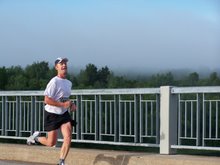
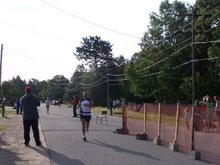
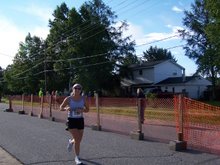

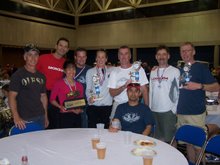

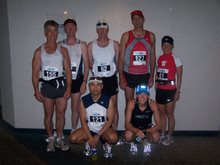
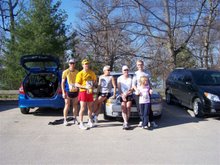

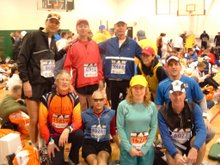
No comments:
Post a Comment